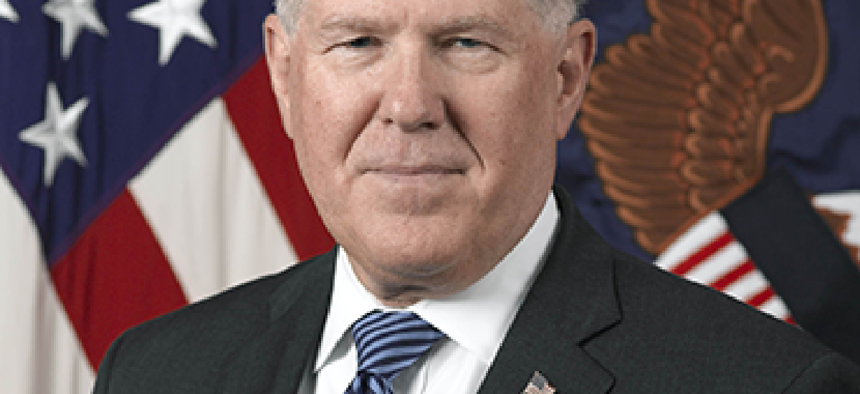DOD's Kendall pushes data for better buying

Experts generally applaud effort to improve defense acquisitions, with a cautionary note.

Frank Kendall is leading an effort to increase the use of data in DOD purchasing. (DOD photo)
A top defense acquisition official plans to update the Defense Department’s Better Buying Power Initiative and push more data analysis into acquisition decision-making. Yet while DOD will benefit from collecting information, experts say, trying to gather too much will come at a cost.
Frank Kendall, undersecretary of defense for acquisition, technology and logistics, and other defense officials seem to believe the more data they can get, the lower the prices, observers say. Moreover, Kendall, who is described as “a data guy,” wants to probe into business cases rather than just accept reported conclusions. He wants to get information from studies on trade-offs and seek out data that may not support the business case. He is seeking an in-depth and well-rounded picture of the acquisition at hand, said Alan Chvotkin, executive vice president and counsel for the Professional Services Council.
Essentially, “he wants explanations behind the PowerPoint slides,” Chvotkin said.
The American Forces News Service on Nov. 5 quoted Kendall saying, “I have a sign outside my door that says ‘In God We Trust; all others must bring data.’” Kendall, who spoke at the 31st annual Government Contract Management Conference in Washington, D.C., said he wants to examine data and figure out which aspects of it are effective. He expects to make changes to the DOD initiative in early 2013.
In acquisition business cases, Chvotkin said, officials should be wary of selective reporting. Like Kendall, they need to probe deeper into data beyond what’s initially presented, and draw out information that may not support the business case. The additional information could affect how senior officials view the acquisition’s outlook. Officials also need to know which pieces of data are critical to have before making a decision, and what data is not needed at all.
Larry Allen, president of Allen Federal Business Partners, applauded defense officials for working to get more data into the acquisition process. However, he warned that they could go too far and hinder their attempts to save money.
“Having a reasonable amount of information is important, certainly, but data collection and provision aren’t done by anyone for free,” Allen said. “At some point, the extra cost it takes to get the extra data actually tips the scales back the other way.”
As officials review their acquisition initiatives, they have to find the balance between collecting data and other aspects of the acquisition process, which can be minimized when data is over-emphasized, Allen said. The collected data is one part of the acquisition process, and “not an inherent ‘good’ unto itself,” he said.
During Operation Desert Storm in the 1990s, for example, DOD had to turn to the Japanese to buy and then ship radios to the troops because the defense procurement system could not move fast enough to get them there, Allen said.
“Let’s not forget that there are more costs to DOD acquisition than just the price the agency pays for something,” he said.
Kendall said he is drafting Better Buying Power Initiative 2.0 to improve defense acquisition. Continuing his efforts to save DOD money, he said, “It’s one of several things I’m doing to kind of move the acquisition process.”
In his speech, Kendall said he is revising the DOD Instruction 5000.02, a manual of acquisition rules. Along with data collection, he is updating the document with new laws. He also wants to include several models for structuring programs.
In 2008, defense officials added on a section on buying services in the weapons system acquisition instruction book. The template in the manual did not suit service contracts because it was geared for products instead, Chvotkin said. Since then, managers and contracting officers have focused on filling in the blanks on the template form instead of focusing on the needs their program. The revisions could allow the department to approach purchases—whether product or a service—in a best-suited model.
In September, the Professional Services Council sent Kendall a three-page letter of improvements to make to DOD’s Better Buying Power Initiative. PSC has held informal meetings with Kendall’s staff about the reforms in recent weeks. Officials did not give the specifics are their reforms, but Chvotkin said they were interested in several of the recommendations in the letter.
PSC recommended the next round of the initiative’s reforms take a balanced approach to regulating contract length, maximizing the appropriate use of “best value” procurement strategies, and even recognizing the importance of company profits by tying the profit margin to the nature of the work and its risk.





